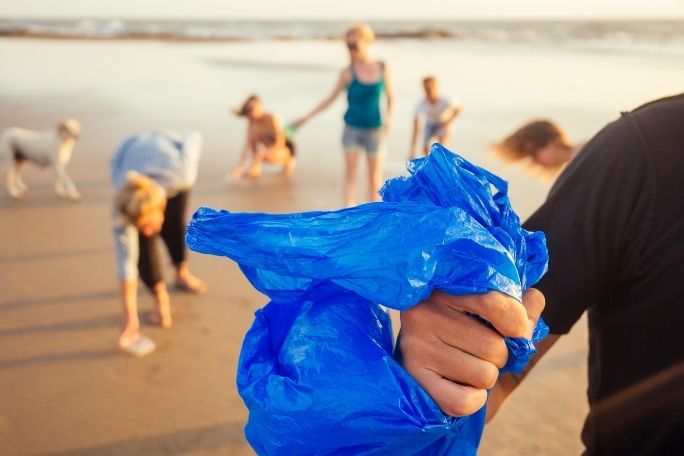Lesson summary
Students reflect on the ways in which plastic waste harms our oceans and consider the actions they can take to reduce the impact of plastic waste on our oceans. They begin by reviewing their prior knowledge of the ways we need and impact the ocean before watching a clip about the power of small actions in relation to plastic waste. They research and select their own actions for reducing plastic waste before thinking about their circle of influence and how they can share messages and actions about plastic waste with the people in their lives. Finally, students produce communication materials to share with these people.
Learning intentions:
Students will...
- understand that we can all take action to stop plastic waste from harming our oceans
- recognise their circle of influence and understand why this is important in inspiring others to take action
Success criteria:
Students can...
- think critically about their own behaviours and actions
- work collaboratively and independently
- create a communication piece
Lesson guides and printables
Lesson details
Curriculum mapping
Australian curriculum content descriptions:
Depending on the activities you choose, you may meet the following content descriptions:
Year 4 HASS:
- The use and management of natural resources and waste, and the different views on how to do this sustainably (ACHASSK090)
- The importance of environments, including natural vegetation, to animals and people (ACHASSK088)
- Reflect on learning to propose actions in response to an issue or challenge and consider possible effects of proposed actions (ACHASSI081)
- Present ideas, findings and conclusions in texts and modes that incorporate digital and non-digital representations and discipline-specific terms (ACHASSI082)
Year 5 HASS:
- The influence of people, including Aboriginal and Torres Strait Islander Peoples, on the environmental characteristics of Australian places (ACHASSK112)
- Reflect on learning to propose personal and/or collective action in response to an issue or challenge, and predict the probable effects (ACHASSI104)
- Present ideas, findings, viewpoints and conclusions in a range of texts and modes that incorporate source materials, digital and non-digital representations and discipline-specific terms and conventions (ACHASSI105)
Year 6 HASS:
- Reflect on learning to propose personal and/or collective action in response to an issue or challenge, and predict the probable effects (ACHASSI132)
- Present ideas, findings, viewpoints and conclusions in a range of texts and modes that incorporate source materials, digital and non-digital representations and discipline-specific terms and conventions (ACHASSI133)
Syllabus outcomes: GE2-1 , GE2-2, GE2-3, GE2-4, GE3-2, GE3-3, GE3-4
General capabilities: Critical and Creative Thinking, Personal and Social Capability.
Cross-curriculum priority: Sustainability (OI.7, OI.8, OI.9).
Relevant parts of Year 4 HASS achievement standards: Students identify the interconnections between components of the environment and between people and the environment. They reflect on their learning to propose action in response to an issue or challenge and identify the possible effects of their proposed action. Students present ideas, findings and conclusions using discipline-specific terms in a range of communication forms.
Relevant parts of Year 5 HASS achievement standards: Students identify and describe the interconnections between people and the human and environmental characteristics of places, and between components of environments. They work with others to generate alternative responses to an issue or challenge and reflect on their learning to independently propose action, describing the possible effects of their proposed action. They present their ideas, findings and conclusions in a range of communication forms using discipline-specific terms and appropriate conventions.
Relevant parts of Year 6 HASS achievement standards: Students reflect on their learning to propose action in response to an issue or challenge and describe the probable effects of their proposal. They present ideas, findings, viewpoints and conclusions in a range of communication forms that incorporate source materials, mapping, graphing, communication conventions and discipline-specific terms.
This lesson is part of the wider unit of work Take 3 For The Sea – Project-based Learning – Years 4 to 6
Time required: 120+ mins
Level of teacher scaffolding: Medium – oversee discussions and activities
Resources required
- Device capable of presenting a website and video to the class
- Materials for communication piece, e.g. device capable of making a short clip, art-making materials
- Plastic Pollution Factsheet (optional)
- Student Worksheet – one copy per student
- Workbooks
Skills
This lesson is designed to build students’ competencies in the following skills:
- Communication
- Critical thinking
- Creativity
- Social skills
Additional info
Take 3 is an Australian charity removing rubbish from the environment through education programs, international campaigns and clean-ups. Take 3’s call to action is simple: Take 3 pieces of rubbish with you when you leave the beach, waterway or… anywhere and you have made a difference.


Welcome back!
Don't have an account yet?
Log in with:
By signing up to Cool.org you consent and agree to Cool's privacy policy to
store, manage and process your personal information. To read more, please see
our privacy policy here(Opens in new tab).
Create your free Cool.org account.
Many of our resources are free, with an option to upgrade to Cool+ for premium content.
Already have an account?
Sign up with:
By signing up to Cool.org you consent and agree to Cool's privacy policy to
store, manage and process your personal information. To read more, please see
our privacy policy here(Opens in new tab).